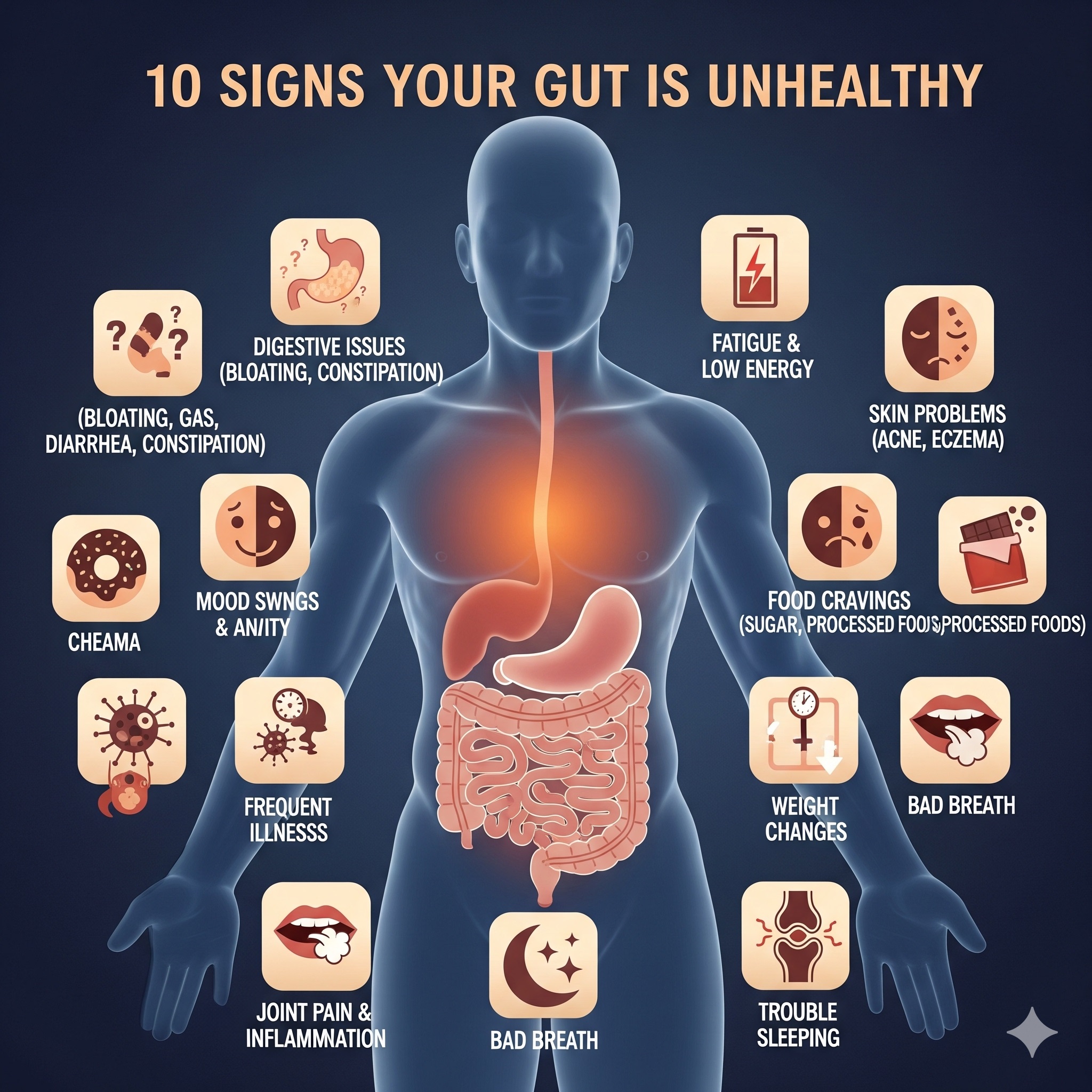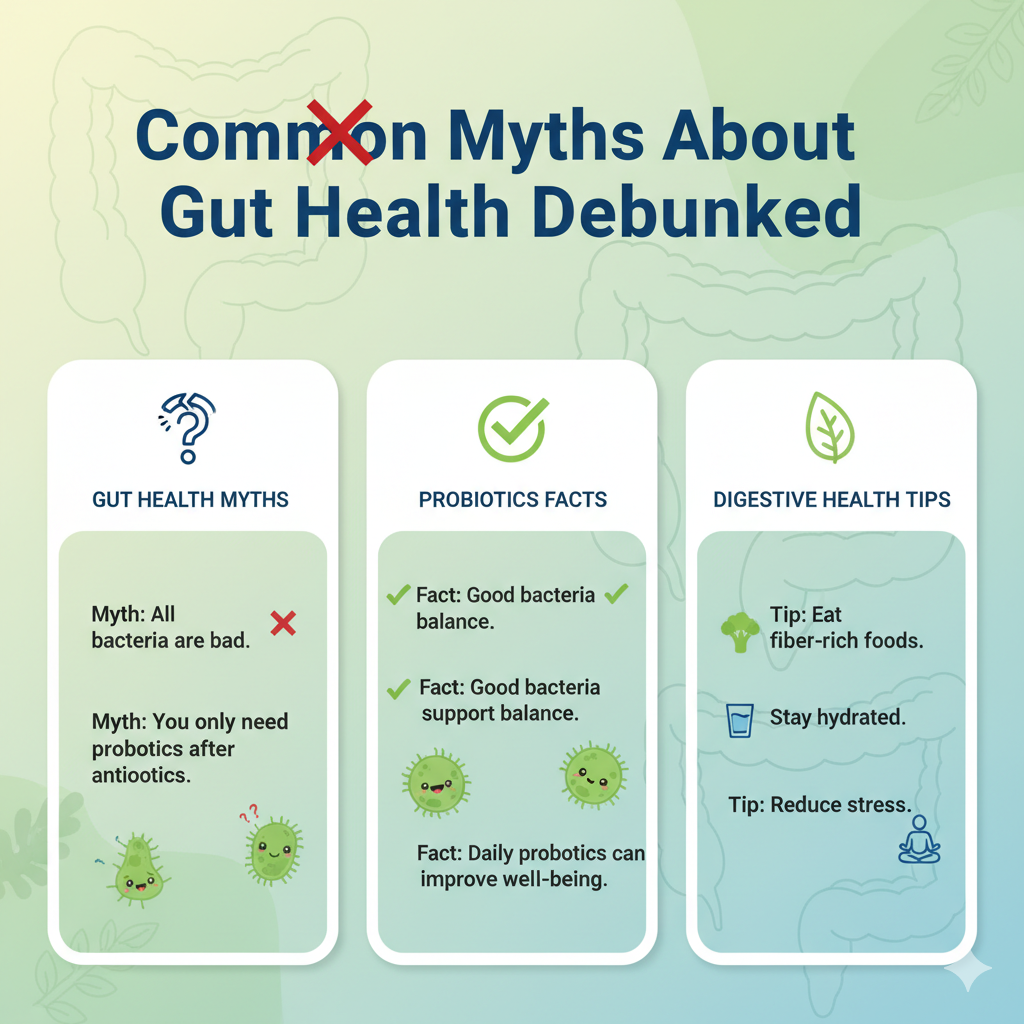Your gut is more than just a digestive organ—it’s home to trillions of microbes that influence digestion, immunity, metabolism, and even mood. When your gut is out of balance, your body often sends warning signals. Recognizing these unhealthy gut signs early can help prevent long-term complications.
Here are the 10 most common signs your gut is unhealthy and what they mean for your overall well-being.
1. Persistent Bloating
Occasional bloating after a big meal is normal, but frequent or painful bloating is one of the most common gut issues. It may indicate poor digestion of certain foods, excessive gas, or an imbalance in the gut microbiome. If bloating happens daily, it’s a red flag that your gut may not be functioning properly.
2. Irregular Bowel Movements
Healthy bowel movements should be regular and comfortable. Chronic constipation, diarrhea, or alternating patterns are classic digestive problems. Such irregularities may point to IBS, IBD, or microbial imbalance.
3. Food Intolerances
If certain foods—such as dairy, gluten, or high-FODMAP ingredients—regularly cause discomfort, your gut may be struggling. Unlike allergies, food intolerances are often linked to poor enzyme activity or microbiome imbalance. They commonly result in bloating, cramping, and other digestive problems.
4. Low Energy and Fatigue
An unhealthy gut may struggle to absorb nutrients, leading to fatigue. Chronic inflammation in the gut is also linked to reduced energy levels. If you feel drained even with adequate sleep, this may be one of the overlooked unhealthy gut signs.
5. Skin Problems
Conditions like acne, eczema, and psoriasis are often tied to gut issues. When the gut barrier is compromised (leaky gut), toxins may enter the bloodstream, triggering inflammation that shows up on the skin.
6. Unexplained Weight Changes
Sudden weight gain or loss without changes in diet or exercise can signal gut imbalance. Poor nutrient absorption, hormone disruption, and altered metabolism are all linked to digestive problems.
7. Weak Immunity
About 70% of the immune system resides in the gut. If you frequently get sick, recover slowly, or suffer from recurring infections, your microbiome may be compromised. Low immunity is often overlooked but strongly connected to gut issues.
8. Mental Health Struggles
The gut-brain axis shows how gut health affects mood and cognition. Anxiety, depression, and brain fog are increasingly associated with microbiome imbalance. Emotional struggles combined with digestive problems may point to poor gut health.
9. Bad Breath
Chronic bad breath isn’t always from poor oral hygiene. It can stem from acid reflux, poor digestion, or microbial imbalance in the gut. Halitosis is a subtle but significant unhealthy gut sign.
10. Autoimmune Conditions
An unhealthy gut may trigger or worsen autoimmune diseases like rheumatoid arthritis, type 1 diabetes, and Hashimoto’s thyroiditis. A leaky gut allows harmful substances to escape into the bloodstream, confusing the immune system and causing it to attack healthy cells.
How to Improve Gut Health
If you notice several of these unhealthy gut signs, there are practical steps to restore balance:
- Eat more fiber-rich foods (vegetables, legumes, whole grains)
- Incorporate probiotics and prebiotics into your diet
- Stay hydrated
- Reduce processed foods and excess sugar
- Prioritize sleep and stress management
- Seek professional advice for chronic or severe digestive problems
Conclusion
Your gut health influences nearly every aspect of your body. Recognizing bloating, digestive problems, and other gut issues early allows you to make lifestyle changes before they lead to more serious conditions. By listening to your gut and taking proactive steps, you can protect your digestion, immunity, and overall quality of life.




